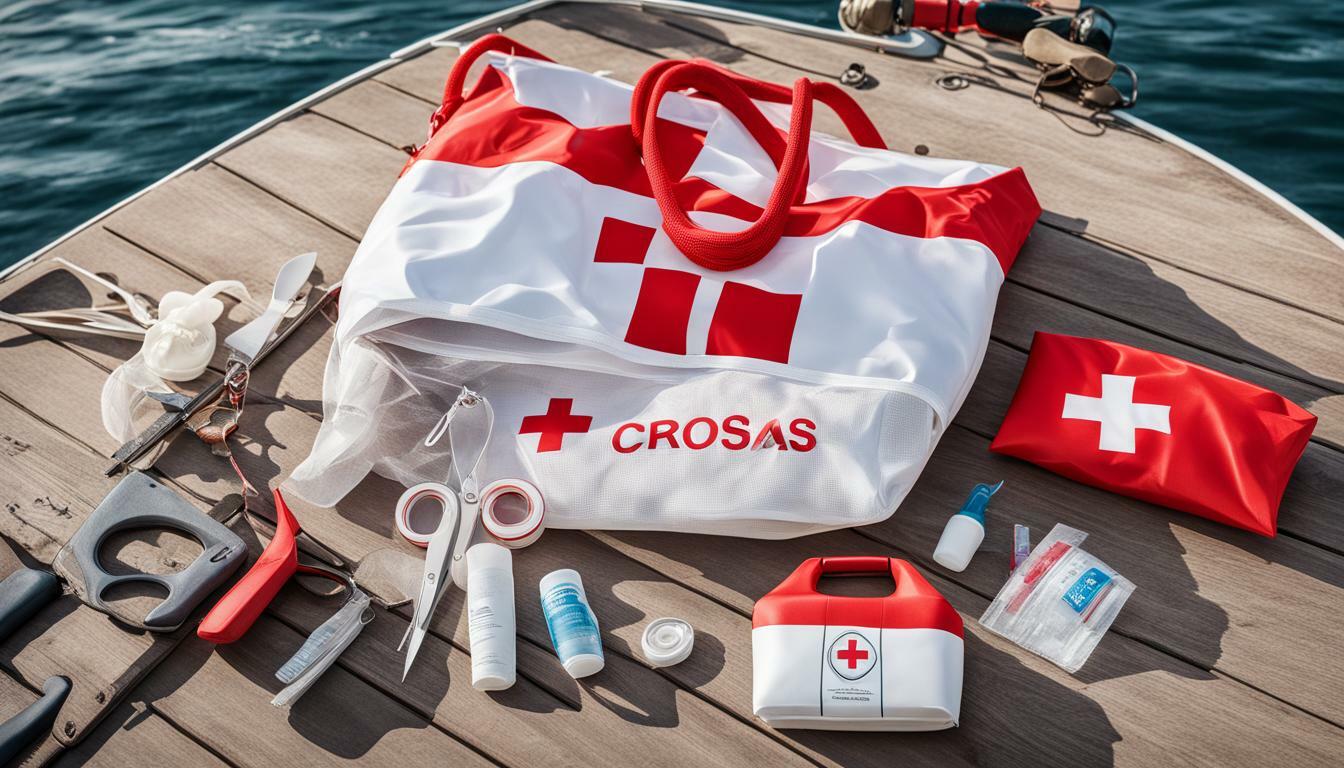Water-based activities like boating and swimming can be incredibly fun and enjoyable. However, as with any outdoor activity, accidents can happen. It’s important to be prepared for any mishaps by having a well-equipped first aid kit specifically tailored for boating and water activities. Safety equipment and emergency supplies are essential to ensure the safety of all participants in water-based adventures.
Water safety is of utmost importance during these activities. Having a proper first aid kit can help in handling maritime emergencies and dealing with injuries that may occur. It is crucial to have the essential items in the kit, such as adhesive bandages, sterile gauze, antiseptic wipes, and waterproof dressings, to be able to address any injuries effectively. Additional supplies like sunscreen, insect repellent, and emergency blankets should also be included depending on the specific needs of the boating and water activity.
Key Takeaways
- It’s important to have a well-equipped first aid kit specifically tailored for boating and water activities.
- Safety equipment and emergency supplies are essential for water safety.
- The first aid kit should include essential items such as adhesive bandages, sterile gauze, antiseptic wipes, and waterproof dressings.
- Additional supplies like sunscreen, insect repellent, and emergency blankets should also be included depending on the specific needs of the boating and water activity.
Understanding Water Safety and First Aid
When it comes to boating and water activities, it’s essential to prioritize safety. This includes having a well-equipped first aid kit and understanding basic first aid techniques. Knowing how to handle common water-related injuries and emergencies can make all the difference in ensuring a safe and enjoyable experience.
First aid essentials should be customized to match the specific needs of the boating and water activity. This includes having appropriate water safety gear such as life jackets, helmets, and wetsuits. In addition, the first aid kit should be regularly maintained and replenished to ensure it’s always ready for use.
Common injuries during water activities include cuts, scrapes, and minor wounds. It’s important to have adhesive bandages, sterile gauze, antiseptic wipes, and waterproof dressings on hand to clean and dress wounds properly. Sunscreen and insect repellent should also be included to prevent skin irritation and bites.
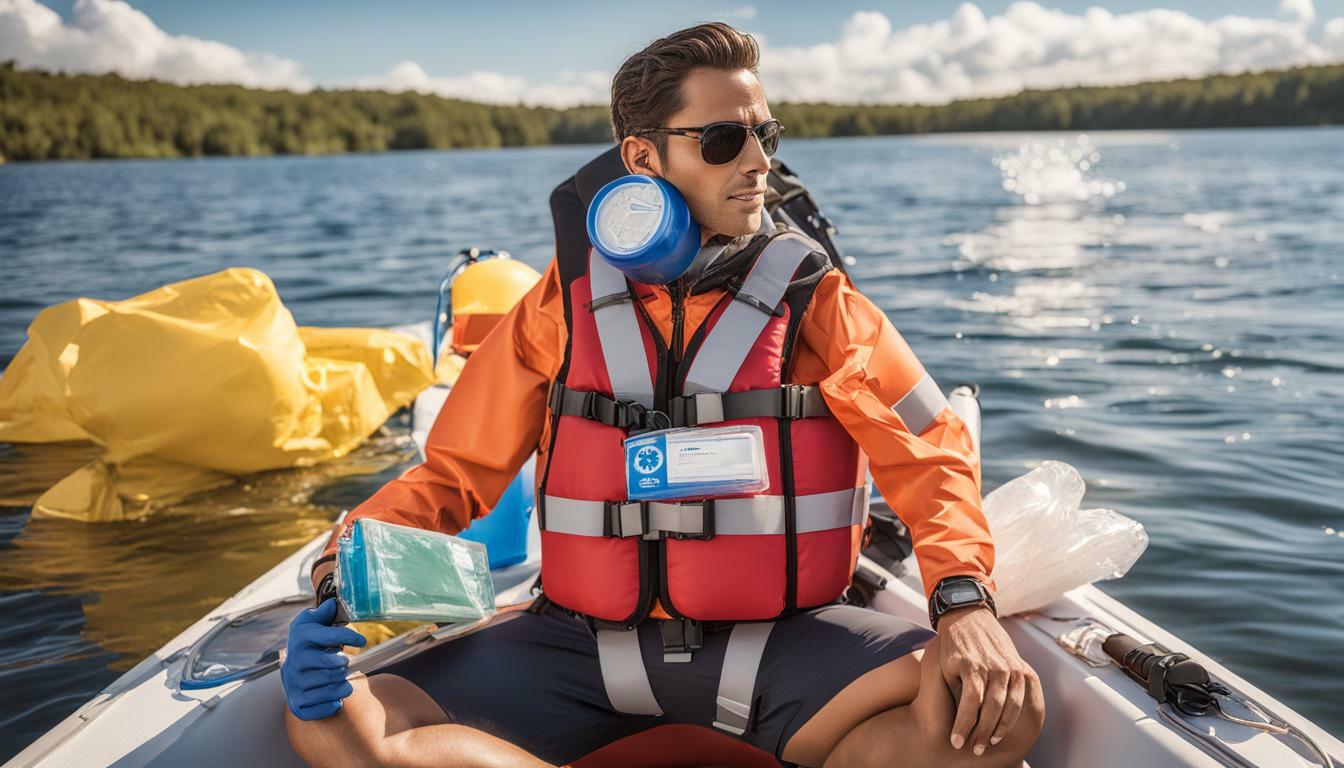
In addition to minor injuries, it’s essential to understand how to handle sprains, strains, and fractures. The first aid kit should include splints or braces for added support, and ice packs and pain relief should be provided to manage the injury.
Heat and cold-related illnesses are also a concern during water activities. The first aid kit should include instant cold packs, thermal blankets, and electrolyte solutions to manage heat exhaustion, heat stroke, hypothermia, and frostbite.
Allergic reactions and marine animal bites may also occur during water activities. The kit should include antihistamines, hydrocortisone cream, and EpiPens to manage allergic reactions. Proper safety gear should also be worn to prevent marine animal bites.
In the event of drowning or near-drowning incidents, the first aid kit should have flotation devices and rescue equipment to aid in water rescues. It’s important to remove the person from the water, initiate CPR if necessary, and seek immediate medical assistance.
Finally, obtaining first aid training specifically tailored for boating and water activities is crucial. Knowing basic first aid techniques and CPR can help respond to emergencies with confidence.
Key Components of a Boating and Water Activity First Aid Kit
When it comes to boating and water activities, having a well-equipped first aid kit is essential for ensuring the safety of all participants. Here are some of the key components that should be included in your first aid kit:
| Item | Importance |
|---|---|
| Adhesive bandages | For covering small cuts and scrapes |
| Sterile gauze | For cleaning and dressing wounds |
| Antiseptic wipes | For disinfecting wounds to prevent infection |
| Waterproof dressings | For protecting wounds from moisture |
| Sunscreen | For preventing sunburn and skin damage |
| Insect repellent | For preventing insect bites and stings |
| Emergency blanket | For keeping warm in case of hypothermia |
It’s important to customize your first aid kit based on the specific needs of your boating and water activity. For example, if you’re going on a fishing trip, you may want to include items like fishing line scissors and pliers to remove hooks.
Regular maintenance and replenishment of your first aid supplies is also crucial. Make sure to check your kit before each outing and replace any expired or used items.
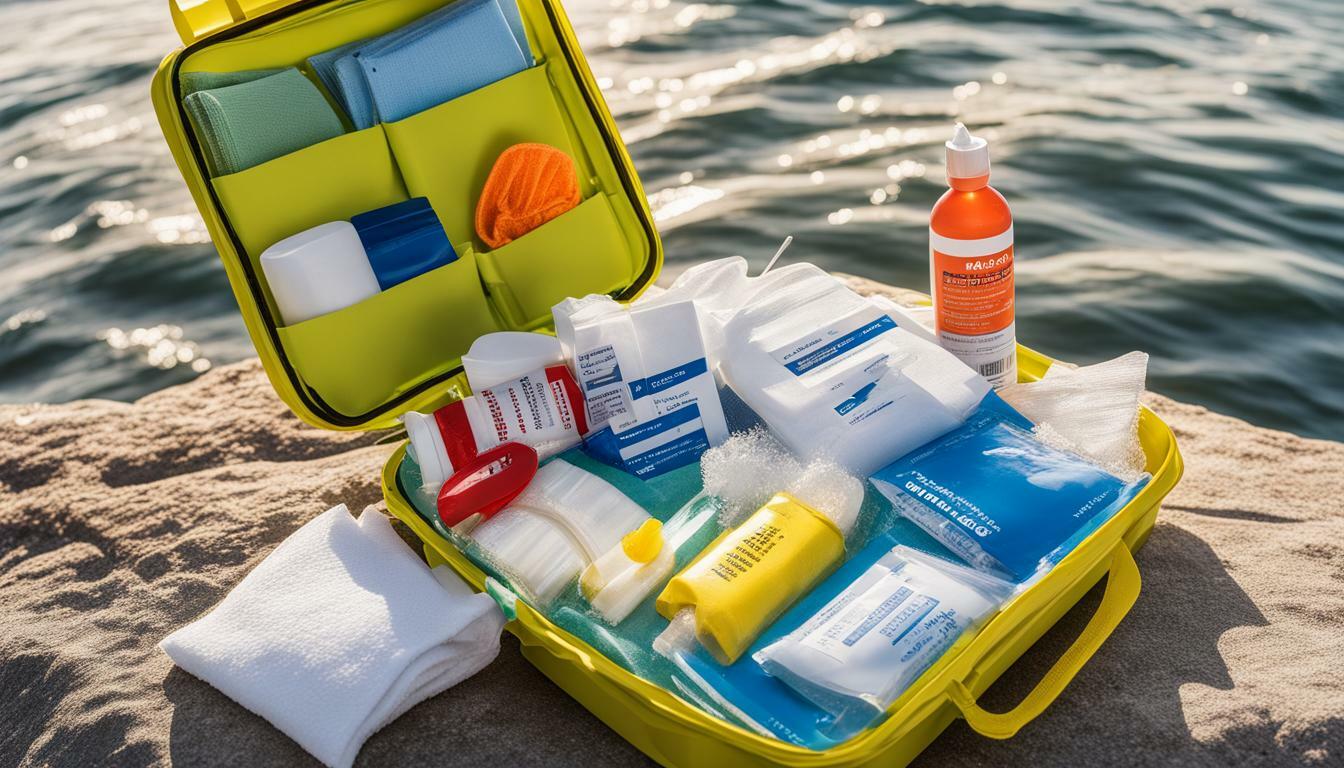
Handling Cuts, Scrapes, and Minor Injuries
When enjoying boating and other water activities, it is important to be prepared for common injuries such as cuts, scrapes, and bruises. With a well-stocked first aid kit, you can quickly address these minor injuries and prevent them from escalating into more serious problems.
First Aid Essentials: Your first aid kit should include adhesive bandages, sterile gauze, antiseptic wipes, and waterproof dressings. These items will allow you to clean and cover any wounds to prevent infection and promote healing. It is also a good idea to keep a pair of gloves in your kit to protect yourself from bloodborne pathogens.
Treating Cuts and Scrapes: To treat a cut or scrape, start by cleaning the wound with antiseptic wipes or soap and water. Dry the area and apply a sterile dressing or bandage. Change the dressing regularly to keep the wound clean. If the wound is deep, or if there is debris inside the wound, seek medical attention.
Preventing Infection: To prevent infection, keep the wound clean and dry. Avoid swimming in dirty water or exposing the wound to sand or other abrasive materials. If you are concerned about infection, seek medical attention right away.
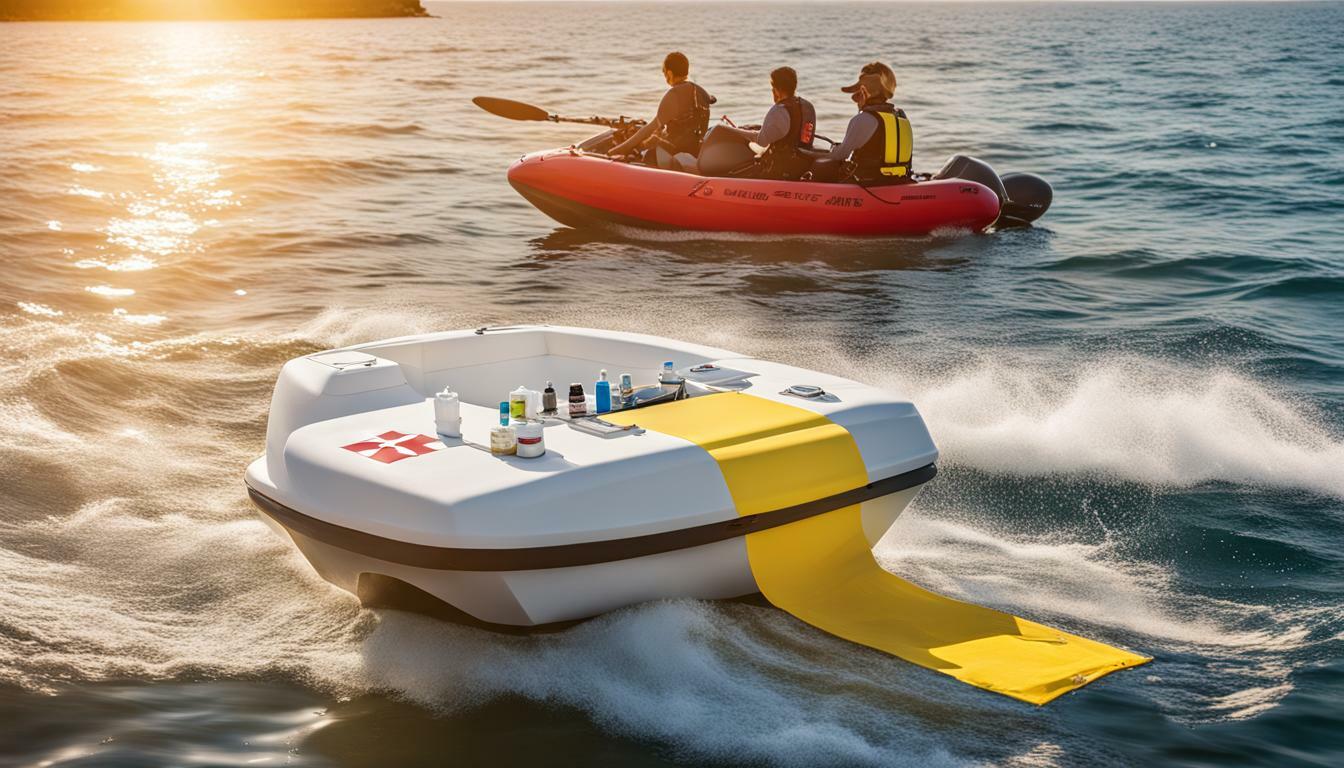
By having the essential supplies in your first aid kit, you can quickly and easily treat cuts, scrapes, and other minor injuries that may occur during your water adventures. Remember to regularly check and restock your first aid kit to ensure it is always ready for use.
Dealing with Sprains, Strains, and Fractures
Boating and water activities can put a strain on the body and lead to injuries such as sprains, strains, and fractures. It’s essential to know how to handle such injuries in a marine environment.
If you or someone in your group experiences a sprain or strain, the first step is to immobilize the injured area. Apply ice packs or cold compresses to reduce swelling and provide pain relief. Painkillers, like paracetamol or ibuprofen, can also help ease discomfort.
If you suspect a fracture, avoid moving the affected area and seek professional medical help immediately.
It’s important to have the necessary supplies in your first aid kit to handle these injuries effectively. Make sure your kit includes items such as adhesive bandages, sterile gauze, and elastic bandages. Consider adding splints or braces for added support in case of fracture.
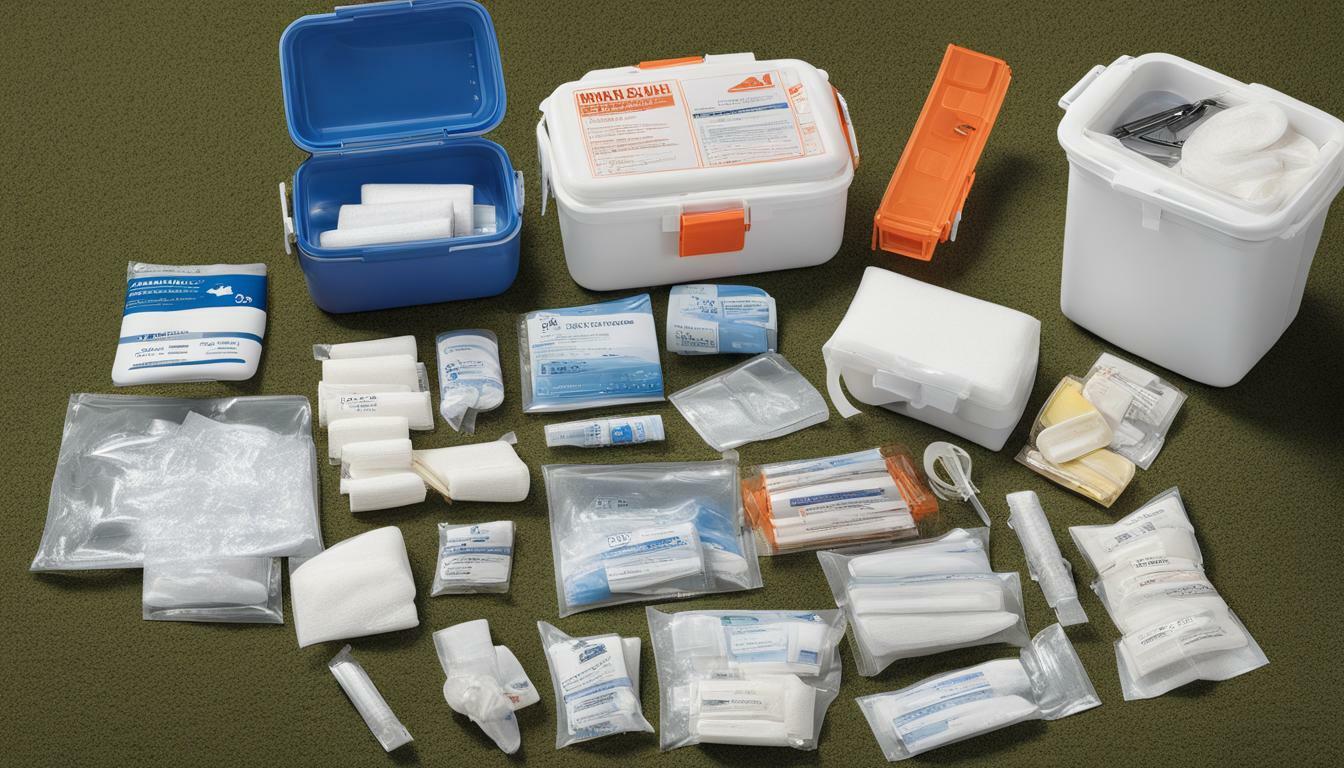
Remember, prevention is key. Take precautions to prevent injuries by wearing appropriate footwear, stretching before and after activities, and being mindful of your surroundings.
By having a well-equipped first aid kit and knowing how to handle sprains, strains, and fractures, you can enjoy your boating and water activities with added peace of mind.
Managing Heat and Cold-Related Illnesses
When engaging in boating and water activities, it is crucial to be aware of the risks associated with heat and cold-related illnesses. Heat exhaustion, heat stroke, hypothermia, and frostbite are common conditions that can arise during water-based adventures.
To prevent these illnesses, it is essential to stay hydrated and protected from the sun, particularly during hot weather. On the other hand, wearing appropriate clothing and staying dry is necessary to prevent hypothermia and frostbite in colder temperatures.
In the event of any heat or cold-related illness, it is crucial to have the necessary emergency supplies in your first aid kit. Instant cold packs are indispensable for treating heat stroke, while thermal blankets are essential for hypothermia. Electrolyte solutions can also help prevent dehydration caused by heat-related illnesses.
Image related to heat and cold-related illnesses:
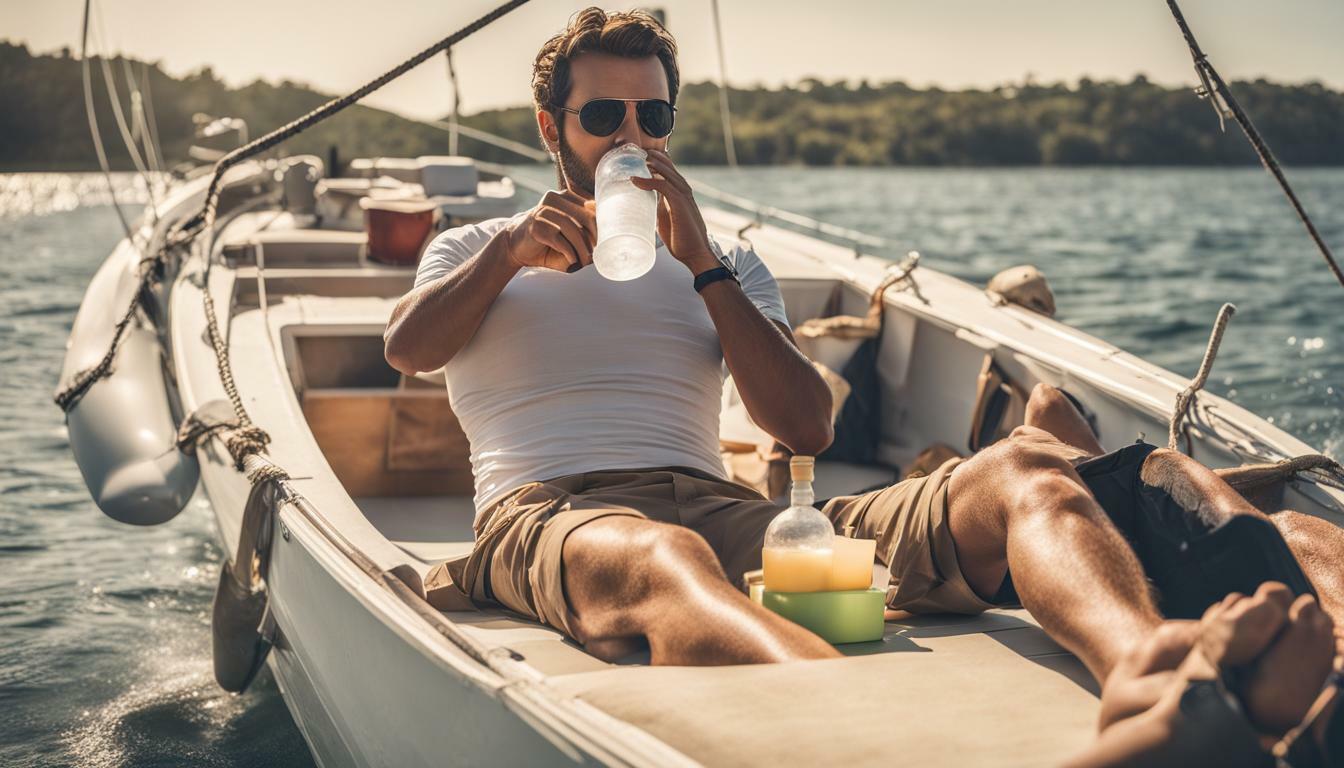
Remember to familiarize yourself with the signs and symptoms of heat and cold-related illnesses and take appropriate measures to prevent and manage them. By being prepared and attentive to your body’s needs, you can stay safe and enjoy your boating and water activities with peace of mind.
Handling Allergic Reactions and Marine Animal Bites
When engaging in boating and water activities, it is important to be prepared for potential allergic reactions and marine animal bites. Your first aid kit for boating and water activities should include emergency supplies, such as antihistamines, hydrocortisone cream, and EpiPens, to treat allergic reactions.
If a marine animal bites you, it is crucial to take immediate action. Rinse the wound with clean water, remove any debris, and apply pressure to stop any bleeding. Use antiseptic wipes to clean the area and cover it with a sterile dressing. Seek medical attention if the bite is deep or if you experience any symptoms such as swelling, pain, or redness.
It is important to wear appropriate water safety gear to prevent marine animal bites. Wearing protective clothing, such as wetsuits or rash guards, can reduce the risk of getting bitten. Additionally, avoid swimming in areas where marine animals are known to inhabit.
Remember, prevention is key in avoiding allergic reactions and marine animal bites during boating and water activities. By being prepared and taking necessary precautions, you can enjoy your marine adventures safely and confidently.
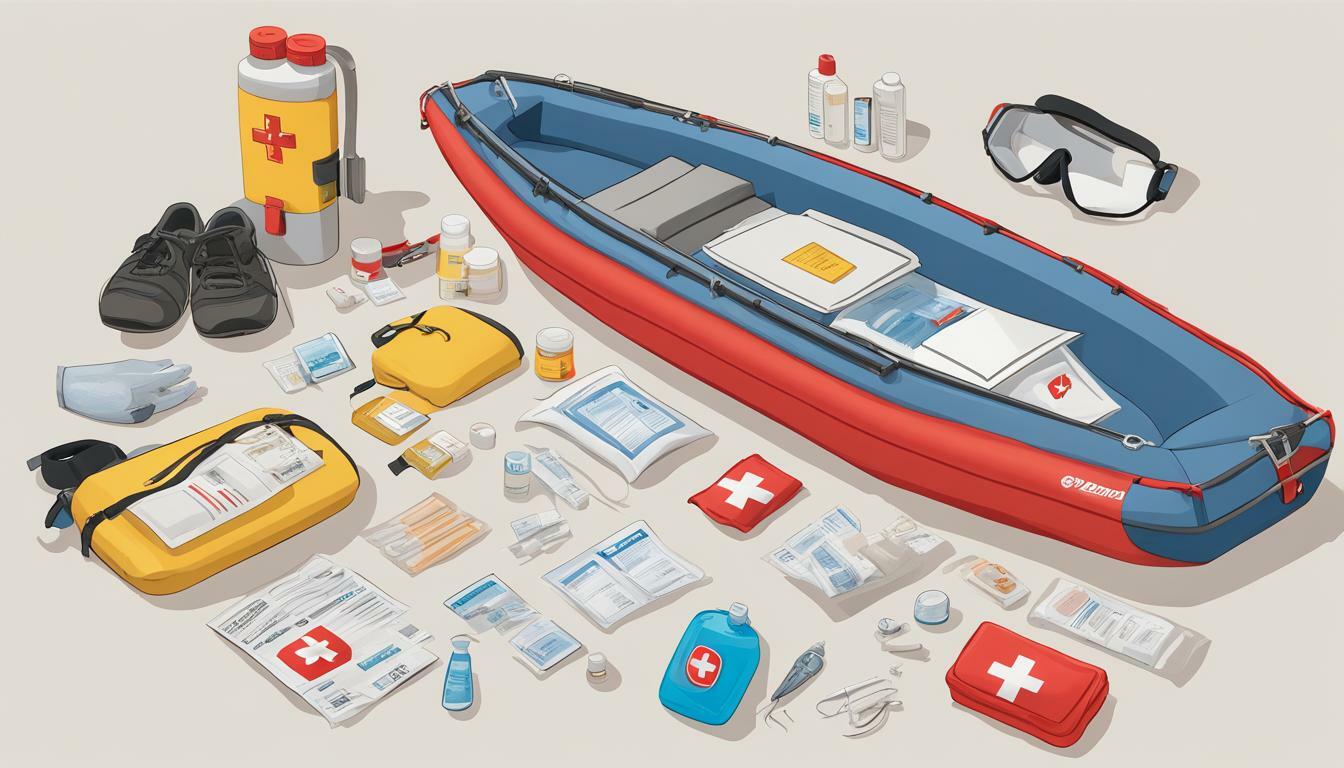
Emergency supplies in your first aid kit for boating and water activities should include antihistamines, hydrocortisone cream, and EpiPens to treat allergic reactions. Take immediate action and seek medical attention if you experience any symptoms after a marine animal bite. Wear protective clothing and avoid swimming in areas where marine animals are known to inhabit to prevent bites and stings.
First Aid for Drowning and Near-Drowning Incidents
Drowning and near-drowning incidents are some of the most serious emergencies that can occur during boating and water activities. In such situations, every second counts, and the proper application of first aid can mean the difference between life and death.
If someone is drowning or has just been rescued from the water, the first step is to remove them from the water as quickly and safely as possible. If the person is not breathing, begin CPR immediately. It is important to seek professional medical help as soon as possible, even if the person appears to be recovering.
The first aid kit for boating and water activities should contain flotation devices such as life jackets and rescue equipment such as throw ropes or rescue buoys. These items can help keep the person afloat and make it easier to pull them to safety.
Additionally, the kit should include Waterproof bandages and antiseptic wipes to address any injuries the person may have sustained while in the water. In any case, prompt and proper response can make all the difference, so it is essential to have a well-equipped first aid kit on hand in case of any maritime emergencies.
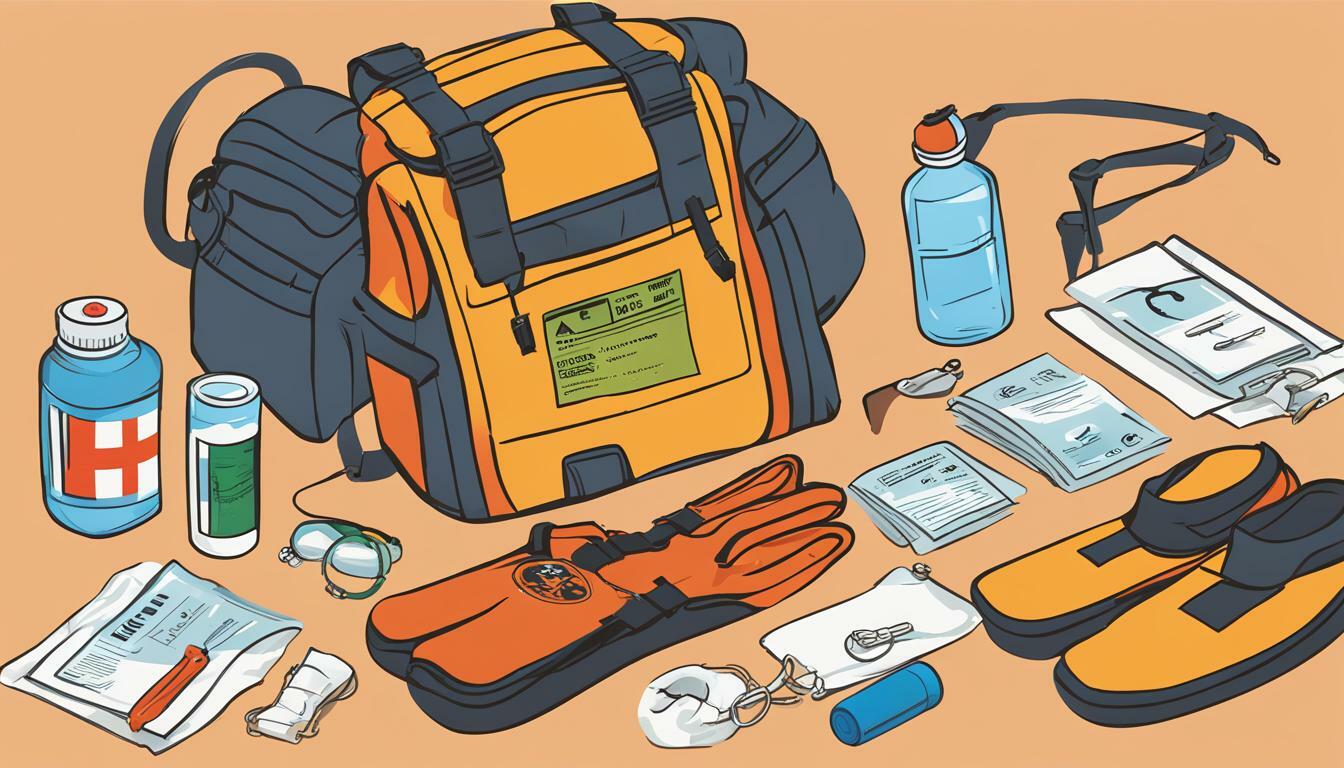
Remember, prevention is always better than cure. Always follow water safety guidelines and take proper precautions while engaging in boating and water activities. But, in case of an emergency, make sure to have the necessary tools and equipment to handle the situation safely and effectively – a properly stocked first aid kit can save a life.
Importance of First Aid Training for Water Activities
When it comes to boating and water activities, safety should always be a top priority. One way to ensure safety is by having a well-stocked first aid kit on board. However, having a first aid kit is not enough on its own. It is also essential to have the knowledge and skills to use it effectively. This is where first aid training comes in.
Boat first aid or maritime first aid training is specifically tailored to address the unique risks and challenges of water-based activities. Through this training, you will learn essential skills such as CPR, wound care, and how to handle water-related emergencies. You will also gain a deeper understanding of water safety and how to prevent accidents from happening in the first place.
Having first aid training can give you the confidence and knowledge to handle any unforeseen situations that may arise during your water activities. It can also help you to be more aware of the potential risks and hazards, and take proactive measures to prevent them.
Marine safety is not something to be taken lightly, and taking the time to undergo first aid training is a crucial step in prioritising your safety and the safety of others around you.
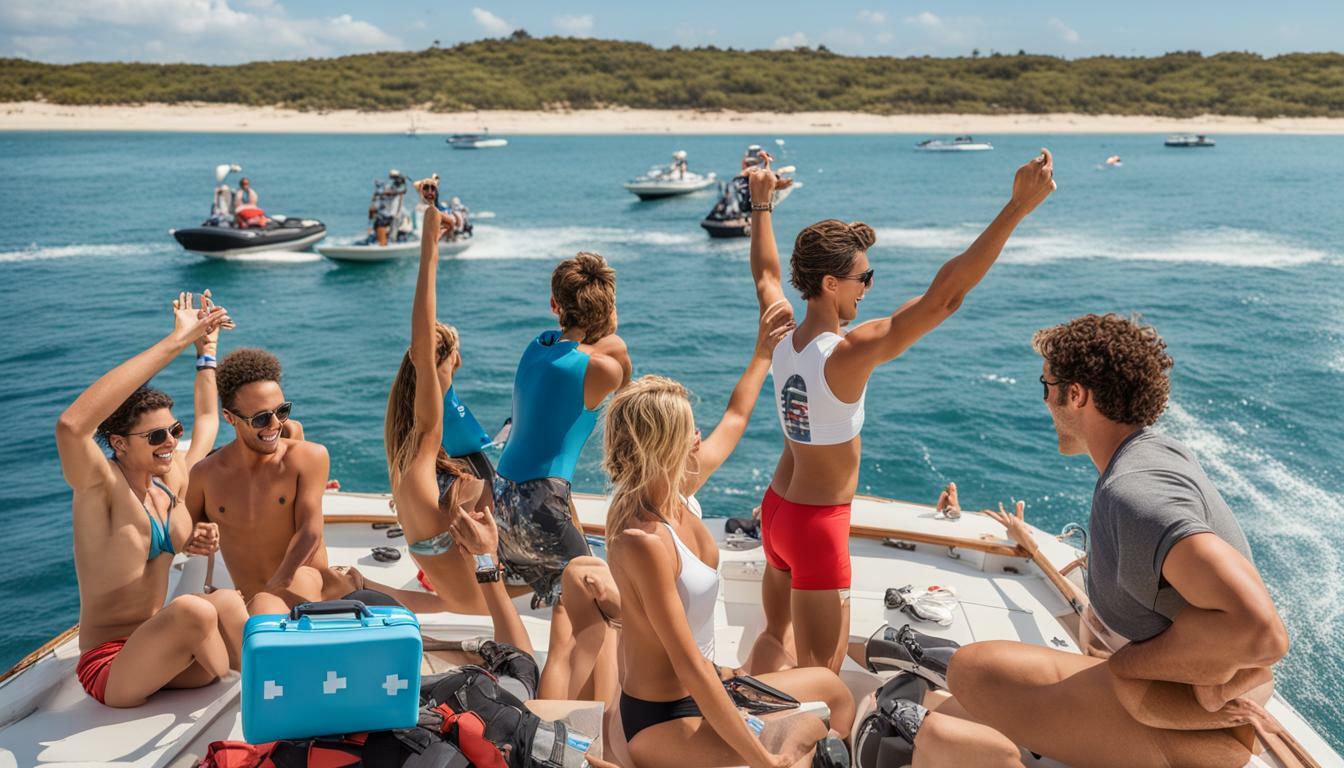
In addition to providing you with vital skills and knowledge, undergoing first aid training can also help to boost your resume and make you a more desirable candidate for job opportunities that involve water activities. It shows potential employers that you take safety seriously and are committed to providing a safe environment for all involved.
Overall, first aid training is a crucial aspect of water safety, and investing in this training can have a significant impact on your ability to handle emergencies in a marine environment. Make sure to prioritize your safety and the safety of those around you by obtaining the necessary training and skills.
Conclusion
To ensure your safety and the safety of others during boating and water activities, it is essential to have a well-equipped first aid kit. Including the right safety equipment and emergency supplies specific to these activities will help you handle maritime emergencies effectively. Remember, water safety is crucial, and having the necessary first aid essentials and water safety gear is a must.
Regularly maintaining and replenishing your first aid supplies is crucial to ensure your kit is always ready for use. Knowing how to handle common injuries and emergencies, like cuts, scrapes, sprains, and fractures, is crucial. It’s also essential to know how to manage heat and cold-related illnesses and handle allergic reactions and marine animal bites.
Being prepared and confident to handle water-related accidents or injuries is crucial. Obtaining first aid training tailored to boating and water activities will provide you with the confidence and knowledge to respond to emergencies effectively.
Prioritising your safety by equipping yourself with First Aid Kits for Boating and Water Activities, emergency supplies, and water safety gear, along with proper first aid training, will make you ready to handle any mishaps that may occur during your marine adventures. Stay safe and enjoy the waters!
